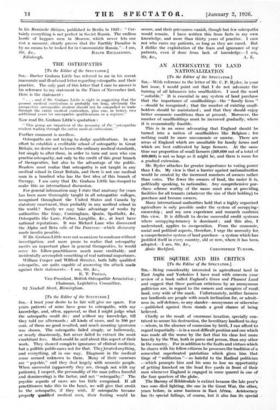AN ALTERNATIVE TO LAND NATIONALIZATION
[To the Editor of the SPECTATOR.] SIR,—With reference to the letter of Mr. C. F. Ryder, in your last issue, I would point out that I do not advocate the turning of all labourers into smallholders. I used the word "suitable." It is essential in any system of land purchase that the importance of smallholdings—the "family farm " —should be recognized ; that the number of existing small- holders should be maintained ; and that they should enjoy better economic conditions than at present. Moreover, the number of smallholdings must be increased gradually, where it is economically feasible.
This is in no sense advocating that England should be turned into a nation of smallholders like Belgium ; for nothing could be more uneconomic or unwise. There are areas of England which are unsuitable for family farms and which are best cultivated by large farmers. At the same time our proportion of small farmers (268,000 out of a total of 409,000) is not so large as it might be, and there is room for a gradual extension.
Mr. Ryder attaches far greater importance to voting power than I do. My view is that a barrier against nationalization would be created by the increased numbers of owners rather than votes. The fewer the owners of land, the easier it is, politically speaking, to nationalize. Any comprehensive pur- chase scheme worthy of the name must aim at providing, facilities for all tenants (whatever the size of their holding) to purchase and become owners.
Many international authorities hold that a highly organized agriculture is only possible under the system of occupying-; ownership ; and my own experience and research confirms, this view. It is difficult to devise successful credit systems -where occupying-tenancy is dominant ; and this also, I' understand, applies to co-operation. From the economic,' social and political aspects, therefore, I urge the necessity for a comprehensive system of land purchase—a system which has justified itself in every country, old or new, where it has been, adopted.—I am, Sir, &c.,










































 Previous page
Previous page